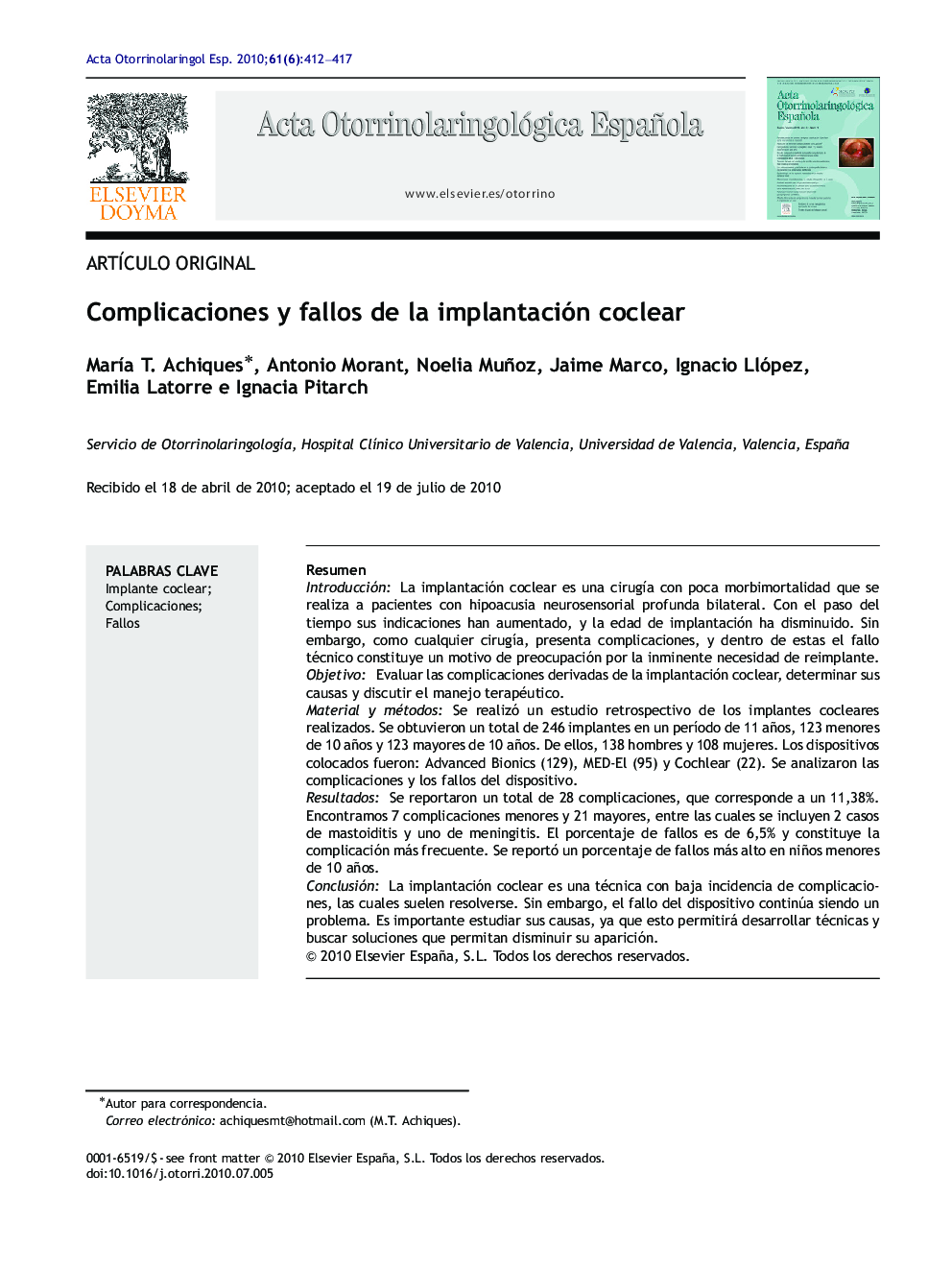| کد مقاله | کد نشریه | سال انتشار | مقاله انگلیسی | نسخه تمام متن |
|---|---|---|---|---|
| 4102163 | 1268811 | 2010 | 6 صفحه PDF | دانلود رایگان |

ResumenIntroducciónLa implantación coclear es una cirugía con poca morbimortalidad que se realiza a pacientes con hipoacusia neurosensorial profunda bilateral. Con el paso del tiempo sus indicaciones han aumentado, y la edad de implantación ha disminuido. Sin embargo, como cualquier cirugía, presenta complicaciones, y dentro de estas el fallo técnico constituye un motivo de preocupación por la inminente necesidad de reimplante.ObjetivoEvaluar las complicaciones derivadas de la implantación coclear, determinar sus causas y discutir el manejo terapéutico.Material y métodosSe realizó un estudio retrospectivo de los implantes cocleares realizados. Se obtuvieron un total de 246 implantes en un período de 11 años, 123 menores de 10 años y 123 mayores de 10 años. De ellos, 138 hombres y 108 mujeres. Los dispositivos colocados fueron: Advanced Bionics (129), MED-El (95) y Cochlear (22). Se analizaron las complicaciones y los fallos del dispositivo.ResultadosSe reportaron un total de 28 complicaciones, que corresponde a un 11,38%. Encontramos 7 complicaciones menores y 21 mayores, entre las cuales se incluyen 2 casos de mastoiditis y uno de meningitis. El porcentaje de fallos es de 6,5% y constituye la complicación más frecuente. Se reportó un porcentaje de fallos más alto en niños menores de 10 años.ConclusiónLa implantación coclear es una técnica con baja incidencia de complicaciones, las cuales suelen resolverse. Sin embargo, el fallo del dispositivo continúa siendo un problema. Es importante estudiar sus causas, ya que esto permitirá desarrollar técnicas y buscar soluciones que permitan disminuir su aparición.
IntroductionCochlear implantation is a relatively safe surgery performed on profound bilateral hearing loss patients. Its surgical indications have increased and the age of implantation has decreased over the last years. As with any other surgery, it presents complications; device failure is one of the most important, given its potential risk for the need to explant and reimplant the device.ObjectiveTo evaluate cochlear implant complications, determine possible causes and discuss medical and surgical management.Material and methodsA retrospective study of cochlear implants was performed. A total of 246 implants over an eleven-year period were evaluated. The sample consisted of 123 implants in patients younger than 10 years old, and 123 in those older than 10 years old; there were 138 males and 108 females. The devices implanted were 129 Advance Bionics, 95 MED-El, and 22 Cochlear. Complications and device failures were analysed.ResultsA total of 28 complications were reported, which corresponds to 11.38% of all implants. Seven minor complications and 21 mayor complications were found. Device Failure was the most frequent complication, reported in 6.5% of all implants, and it was more frequent among children less than 10 years old.ConclusionsCochlear implant surgery has a low complication rate. Complications are usually resolved easily, but device failure continues to be a problem. It is important to keep studying the causes of such failure to find possible solutions that can lead to lowering and resolving its appearance.
Journal: Acta Otorrinolaringológica Española - Volume 61, Issue 6, November–December 2010, Pages 412–417